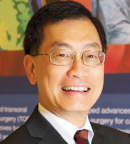
Chi Van Dang, MD, PhD
The Ludwig Institute for Cancer Research announced the appointment of Chi Van Dang, MD, PhD, as its Scientific Director. A hematologic oncologist and renowned researcher, Dr. Dang joins Ludwig from the University of Pennsylvania Perelman School of Medicine’s Abramson Cancer Center, which he has directed since 2011.
As Scientific Director, Dr. Dang will oversee the execution of Ludwig’s scientific strategy to advance the prevention, diagnosis, and treatment of cancer, with a special focus on the operations and staffing of the Lausanne, Oxford, and San Diego Branches of the Ludwig Institute for Cancer Research. He will also align these efforts with those of the six independent Ludwig Centers across the United States to further cultivate collaboration within Ludwig’s global research community.
“Ludwig has a rich history of discovery in basic and translational cancer research, and I am excited and honored by the opportunity to lead its network of accomplished scientists,” said Dr. Dang. “We are today at a unique place in the history of this field, in which advances in a variety of biomedical disciplines are converging at an unprecedented rate to revolutionize our understanding of cancer. Ludwig is well positioned to take advantage of this phenomenon, as many of its scientists and research groups are playing a leading role in driving this convergence. I look forward to working with Ludwig researchers across institutions and disciplines, drawing on each group’s expertise and interests to forge collaborations aimed at solving specific and significant challenges of cancer research—and to translating their insights into therapies and diagnostics that will benefit patients.”
Research Accomplishments
Dr. Dang is best known for his elucidation of the molecular signaling pathways and mechanisms that govern the unusual metabolism of cancer cells, which require vast quantities of energy and molecular supplies to sustain their wild proliferation. His laboratory was the first to show that a master regulator of gene expression named MYC alters the utilization of a key sugar in cancer cells.
This body of work, which explained a hallmark of tumor metabolism known as the “Warburg effect,” bolstered the hypothesis that cancer cells can become addicted to their reengineered signaling pathways and dependent on particular nutrients. Dr. Dang and his colleagues also showed that disrupting those pathways could be a powerful approach to treating cancer and identified drug targets to that end. Therapies based on this work are today in various stages of clinical development.
Background
Dr. Dang was born in Saigon, Vietnam, 1 of 10 children and the son of the nation’s first neurosurgeon and Dean of the University of Saigon’s School of Medicine. He came to the United States in 1967 and obtained a PhD in chemistry from Georgetown University. He earned an MD from Johns Hopkins University and completed a fellowship at the University of California, San Francisco, before returning to Hopkins, where he became Vice Dean for Research and Director of the Hopkins Institute for Cell Engineering. He subsequently joined the Abramson Cancer Center.
He was recently appointed to the Blue Ribbon panel that provided strategic guidance to Vice President Joe Biden’s Cancer Moonshot initiative. He is a member of the U.S. National Academy of Medicine, Fellow of the American Academy of Arts and Sciences, and currently chairs the National Cancer Institute’s Board of Scientific Advisors. ■

